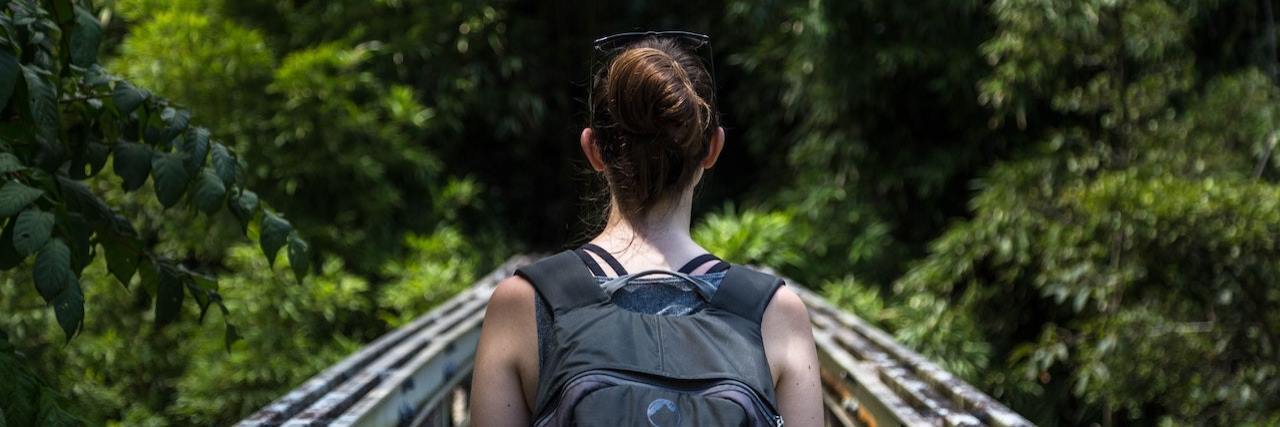What Happened When I Stopped Taking Antidepressants to Travel Abroad
I was a senior in college when I started feeling the need for adventure again, the urge to point to a spot on the map and take off, to find myself surrounded by fresh beginnings and new experiences. Growing up in small-town Nebraska, I’d always dreamed of moving to a new country — somewhere with towering skyscrapers and the bustle of life rushing past.
When I was knocked flat by depression in 2009, though, my dreams dissipated. It was all I could do to get through each day, and although over time therapy came easier and medication worked wonders, I spent most of my college years waiting for the other shoe to drop. I was at the top of the seesaw, and although it was better than the bottom, I lived in fear that the slightest change would bring me crashing down.
So it was in 2013 when I felt the pull of the world again. With a dual major in Spanish and global studies, I guess I wasn’t surprised the familiar itch had returned, but the fact remained that a sweeping change like moving abroad could very well topple the tower I’d worked so hard to balance. What is life for, though, if not for adventure? I reasoned. The risks were a little scary, but the lure of escapades in a new environment eventually won out and—boom—I found myself applying to teach English in South Korea.
I was excited, no doubt. An abundance of kimchi, pajeon, new friends and rich experiences awaited! There was a problem, though: Korean society seemed a little less open regarding matters of mental health.
I’d heard this, yes, but I had not been expecting to have to sign a form listing all my medications and declaring that I was not taking any kind of depression or anxiety medication. My heart sank. The more I thought about it, the more I realized moving abroad can place an individual under a huge amount of stress, especially given the fact that they are now so far removed from the support networks they may have had back at home.
Although I was to discover later that Korean society does still have a fair way to go when it comes to destigmatizing mental health issues (honestly, don’t we all?), I was able to see the logic behind the forms. These employers were shelling out quite a bit in visa fees, airfare, accommodation and salary, after all. It made sense they’d want to ensure the mental health of their employees was in solid condition so as to avoid a potential disaster, both in how the children might be affected if their teacher’s mental health collapsed, and also in financial damages.
The thing was, my mental health was in solid condition at that point. Yes, I was taking a small dose of antidepressant every day, but I wasn’t having issues with anxiety and things in general were feeling pretty good. Still, I wasn’t comfortable with lying on my forms, so I spoke with my doctor and she agreed I was in a good place to start going off my medication.
It worked! We gradually decreased my dosage, and aside from a few little hiccups here and there, things went smoothly. It was the first time in four years that I’d been without depression medication, and being back to my “old” self felt empowering. What at first felt like discrimination had ended up leading to a something I didn’t know was possible for me—life without meds. I signed the forms, landed a job and headed off to Korea in August.
It was October when things started to take a turn. I was having some pretty difficult issues in my personal life back home which didn’t help things, but my first few months in Korea were, in general, quite lonely. I hadn’t yet made friends, felt isolated because I couldn’t speak the language yet and my depression was starting to creep back into the forefront. These were all things to be expected, of course, but knowing I had to keep my depression a secret made things worse.
Fortunately, my doctor had suggested bringing a month’s worth of antidepressant as a contingency plan in the event I might need it. Saying nothing to no one (except my doctor), I went back to my normal dosage of antidepressant and the swirling black clouds started to lighten.
As those who have struggled with depression know well, it didn’t happen all at once. There were quite a few weekends I spent at home in bed, curled up with an old episode of It’s Always Sunny in Philadelphia, desperately trying to drag myself out of the darkness. Eventually, though, the sun came through again and I was able to enjoy this exciting new world of ancient palaces and sleek skyscrapers.
Although it didn’t take me long to open up to my expat friends about my struggles with depression, I was apprehensive about letting my Korean friends know. When I finally did, the majority of them encouraged me to “cheer up,” insisting I didn’t need medication to “smile and be happy,” which those who have battled mental health issues know to be an absolute oversimplification and not usually possible. It was frustrating, sure, but I never held it against them. After all, when depression is a hush-hush topic and you’ve never experienced someone being open and OK about it before, how would you know to respond any differently? My friends deeply cared about me, and I knew that—they were just expressing it in the ways they’d been shown.
I’m still on antidepressants, right this very day. It’s been 10 years now, and I’m OK with it. Before I moved to Korea, I think I still judged myself, still felt that somehow weaning myself from my medication was an accomplishment to strive for. I live in Israel now, where mental health issues are much more openly spoken about, and getting treatment for depression is easy and accessible. For this, I’m very grateful.
I’m grateful for Korea, too, though. Although at times I felt the sting of social discrimination, I learned how to assert myself when it comes to matters of mental health, learning how to meet not only others, but also myself, right where we are.
Photo by Christian Joudrey on Unsplash


